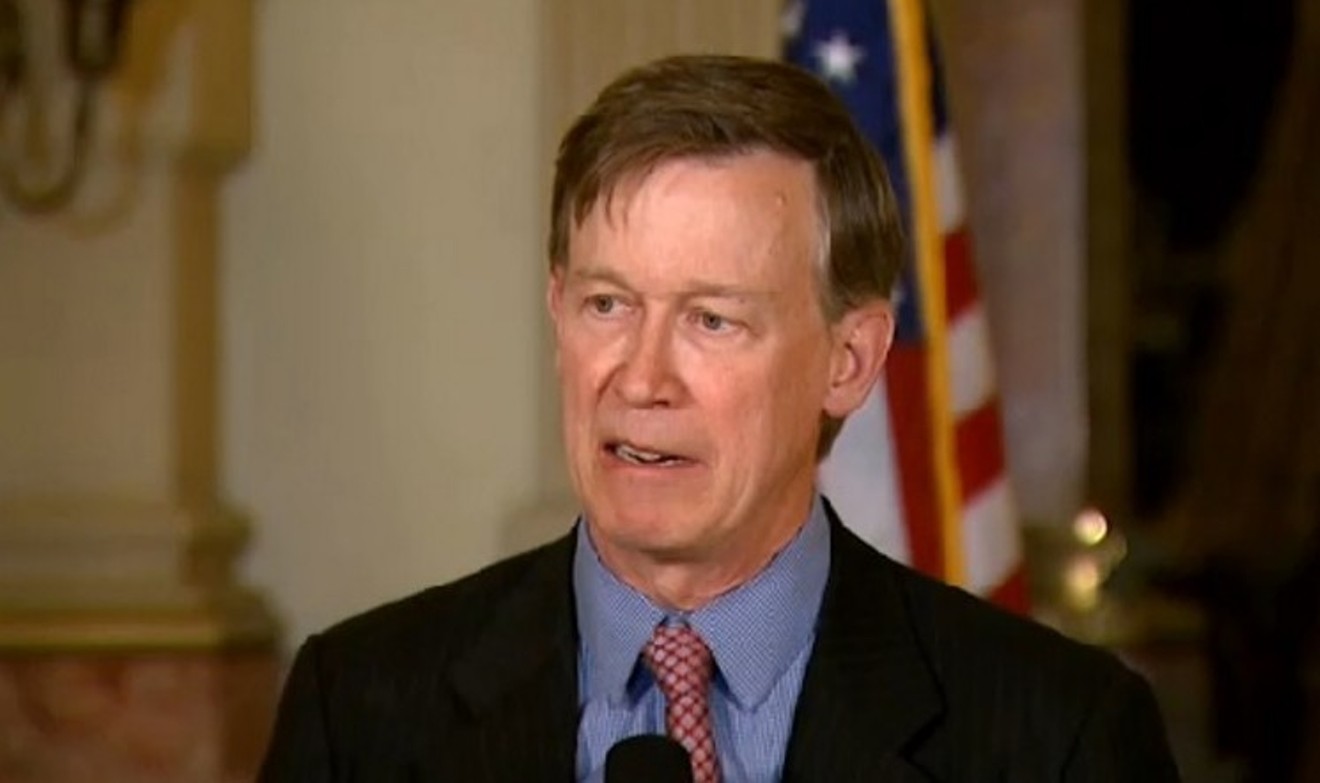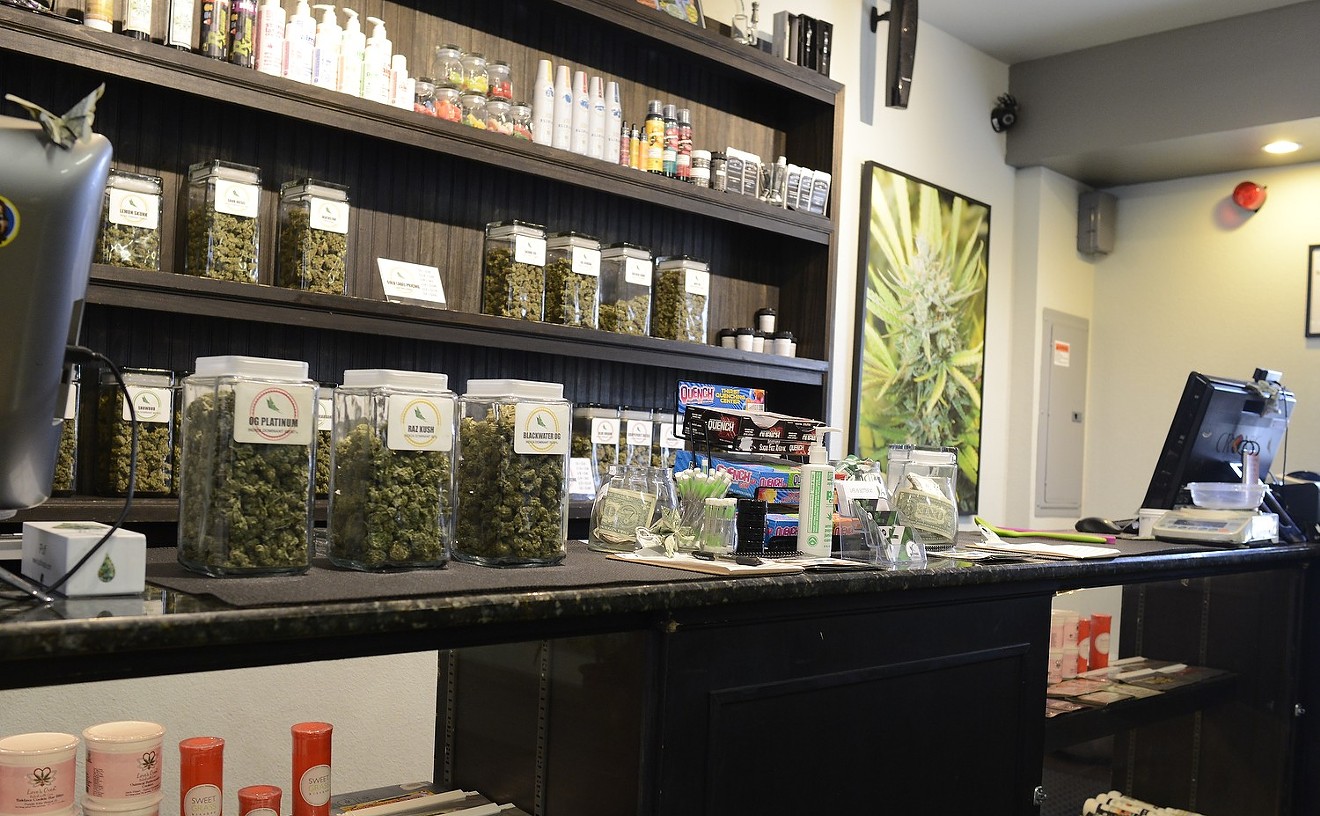Governor John Hickenlooper has vetoed three cannabis-related bills in a span of two days, extending his count on Tuesday, June 5, when he rejected one bill that would have added autism to the state's list of acceptable medical marijuana conditions and another measure that proposed more flexibility in investing in cannabis businesses. The vetoes came just one day after the governor dismissed a bill that would've allowed dispensaries to apply for cannabis tasting rooms.
Advocates of all three bills were worried about looming vetoes, since the bills had passed over a month ago, with some proponents even wondering if a future presidential campaign was affecting Hickenlooper's decision — a suggestion he shot down during a news conference on June 5.
That same day, families of autistic children had rallied outside of Hickenlooper's office at the eleventh hour in hopes of persuading him to sign HB 1263, even securing two separate meetings to plead their case. Despite the public pressure and the bill passing through the General Assembly with a wide a majority of supporters, the governor vetoed adding autism spectrum disorder to the state's list of qualified MMJ conditions, citing the need for more scientific evidence of its efficacy.
“While we are very sympathetic with families advocating medical marijuana (MMJ) as a safer and more effective treatment for their children, we cannot ignore such overwhelming concerns from the medical community,” Hickenlooper writes in a letter that accompanied the veto. “In vetoing this bill, we do so on sole concern that medical efficacy of MMJ to treat ASD has yet to be fully studied by medical professionals and scientific experts entrusted to this role at the Colorado Department of Public Health and Environment.”
According to the governor's office, an executive order will be issued directing the CDPHE — which publicly opposed the bill — and the Colorado Board of Health to begin researching the "safety and efficacy of medical marijuana for the treatment of autism spectrum disorder in children."
For the families who rallied outside of his office, however, that executive order will be too little, too late.
"This is a sad day for the autism community in Colorado. This is a devastating day for our children. We will never give up. We will never stop fighting. Our children will win," Michelle Walker, a proponent of the bill who'd organized the rally outside of Hickenlooper's office, wrote on social media. In a text to Westword, Walker says she plans to continue advocating for adding ASD to the state's MMJ list.
Congressman Jared Polis, a Colorado gubernatorial candidate, also criticized Hickenlooper for vetoing the bill.
"Unfortunately, in the past two days our governor has vetoed three significant pieces of legislation that would have helped Colorado families and businesses. HB 1263, led by Rep. Hooton and Sen. Fenberg, would have helped Coloradans with autism receive the care that will help them go to school, start careers, and live fulfilling lives," Polis said in a statement. "I hope to see these thoughtful, bipartisan bills to help Coloradans with autism and grow our economy reintroduced in the next legislative session. If they are, and if I'm governor when that happens, I will gladly sign them into law."
While HB 1263 moved through the legislature with little opposition, HB 1258, the tasting-room bill, and HB 1011, which would have allowed publicly traded businesses to invest in the pot industry, faced more obstacles along their respective paths. Both required amendments and delayed readings in order to get enough support for House and Senate approval, and proponents and opponents alike wondered how the federal government would react to state measures that further conflicted with pot's Schedule I status.
“The marijuana industry is organically expanding. While we wish to encourage business opportunity, we must approach capital expansion in the market in a way that is consistent with our federal oversight, and not degrade the robust regulatory system that Colorado worked so hard to establish,” Hickenlooper explained in a statement discussing his vetoes.
Because the 2018 legislative session ended May 10, the vetoes cannot be contested by the General Assembly. Instead, the measures could be reintroduced next year, when a new governor will be at the Colorado State Capitol.
[
{
"name": "Air - MediumRectangle - Inline Content - Mobile Display Size",
"component": "12017618",
"insertPoint": "2",
"requiredCountToDisplay": "2"
},{
"name": "Editor Picks",
"component": "17242653",
"insertPoint": "4",
"requiredCountToDisplay": "1"
},{
"name": "Inline Links",
"component": "18838239",
"insertPoint": "8th",
"startingPoint": 8,
"requiredCountToDisplay": "7",
"maxInsertions": 25
},{
"name": "Air - MediumRectangle - Combo - Inline Content",
"component": "17261320",
"insertPoint": "8th",
"startingPoint": 8,
"requiredCountToDisplay": "7",
"maxInsertions": 25
},{
"name": "Inline Links",
"component": "18838239",
"insertPoint": "8th",
"startingPoint": 12,
"requiredCountToDisplay": "11",
"maxInsertions": 25
},{
"name": "Air - Leaderboard Tower - Combo - Inline Content",
"component": "17261321",
"insertPoint": "8th",
"startingPoint": 12,
"requiredCountToDisplay": "11",
"maxInsertions": 25
}
]












